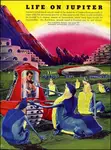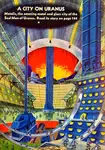- Home
- Your Views
- Pinnah-Birds and Genetic Engineering
Pinnah-Birds and Genetic Engineering
by Dylan Jeninga
(Chicago, Illinois, USA)
So I was reading The Seedling Stars by James Blish, and on page 35 I came across a passage which might answer your question as to the nature of the plant life on Ganymede, Zendexor.
"Coming back to the station, he saw a pinnah-bird. It burrowed into the nearest drift as soon as it saw him, but for the preceding instant he had company. He never saw it again, but now and then he thought about it."
It's just a little throw away passage, but to me it speaks volumes about the biosphere of Ganymede. A local animal which is fairly illusive, and therefore not introduced by the colonists as a foodstuff. Nor is it part of any planetary engineering project, since that would run counter to the point of creating adapted humans to suit the planets as they are. Also, nowhere is there any mention of adapting animals or plants as well as humans in the story.
If, then, the pinnah-bird is a native beast, then it follows that the plant life is likely native as well, and probably that there are a variety of Gabymedian lifeforms that don't appear in the story.
After my thrill at the discovery had faded, I wondered how you would view the colonists, Zendexor. Being adapted perfectly to Ganymede, would you consider them proper Ganymedians? And further, if any lifeform is adapted to the stresses of a new planet, might it then be of that planet and not of Earth? Stirling's Martians, for example, have undergone extensive genetic engineering to suit themselves to Mars.
I tend to think that, yes, the colonists are Ganymedians, and that the Martians are just that. But that simply comes out of a bias on my own part: I want to enjoy the story, and thinking of them as Earth people merely would spoil things a little bit.
But I wonder how you see it?
{Z: That fragment about the pinnah bird is most important - thanks for drawing it to my attention. I shall do a link to your comment from the Ganymede page.
On the question you end with, I'd like to see the matter the way you do, but wouldn't it be even better if the Ganymedean folk were like the pinnah bird? There's a real Ganymedean for you!
However, maybe there's a way of combining Blish's pantropy with native authenticity, if the process is viewed as teleologically weighted in favour of the result. Then the Earthly phase of the beings' ancestors becomes a mere prequel to the main, Ganymedean, phase of the story.
My imagination is sufficiently flexible to carry out such mental acrobatics, but it would prefer not to have to take the trouble! The Barsoomians' origin in their Tree of Life is much more agreeable to me; as is the Perelandrians' origin in their sea folk.
Having said all that, I find Blish's adapted Ganymedeans fascinating, and I admit that the literature would be the poorer for their absence.}






































